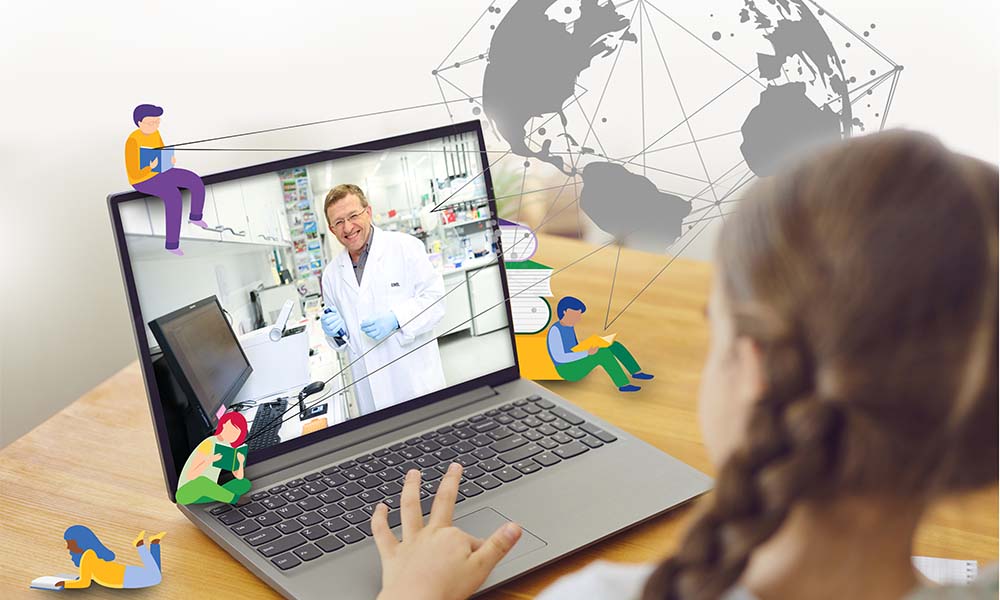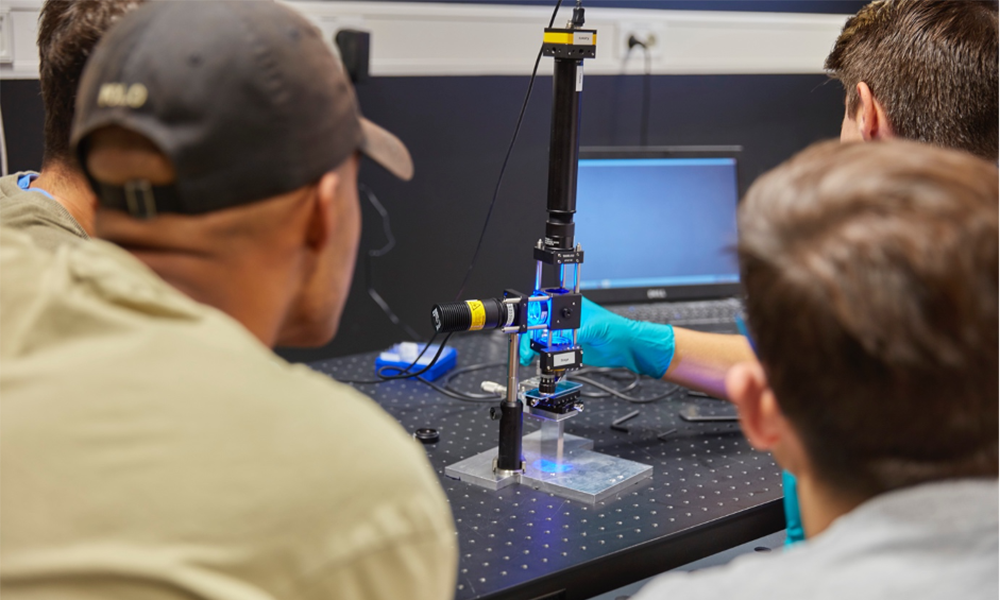Seeing more, learning more
An EMBL-developed kit introduces hands-on fluorescence microscopy to secondary school students.
A year of exceptional life science research, training, service, industry collaboration, and integration of European life science research.

In 2020, the COVID-19 pandemic brought in-person activities, events, and training to an abrupt halt. EMBL was quick to adapt, capitalising on its four decades of training excellence to launch a variety of online offerings for uninterrupted learning. In 2021, it continued to expand virtual training, innovating rapidly as it embraced multiple approaches.
EMBL’s courses and conferences office organised over 50 virtual conferences and workshops, attended by over 9,700 people – a number that physical events could not have matched. Indeed, this new style of scientific networking led to increased accessibility and participation for researchers from underrepresented communities and regions, for whom travelling to a conference venue presents challenges. To offer remote visualisation and image data analysis capacities, many of these courses relied on computational resources such as the EMBL 3D Cloud delivered by EMBL IT Services.
“With the lower cost of participating remotely and now with advanced virtual conference and course platforms in place that really make the most of the digital events experience, we’re seeing many more participants, including those from labs that may not have the budget to send scientists all the way to Germany,” said Geoff Barnett, Head of the EMBL Course and Conference Office.
Along the same lines, EMBL-EBI’s training website got a makeover to ease accessibility at a time when online training resources were in greater demand. This new site should help users more easily match the best training to their needs.
While knowledge exchange flourished through virtual conferences, laboratory training did not lag behind, thanks to the External Scientific Courses team, who developed virtual course formats that allowed for training practical wet-lab-based experimental content.
In 2021, 15 courses with practical content were held on the purpose-built virtual platform EMBL eCampus, specifically developed by the team. This was a major achievement for the participants in times when many courses were cancelled or only continued as lecture-based theoretical formats. Equal efforts were contributed from teams like EMBL Hamburg’s Svergun Group. The Svergun group has offered practical courses on biological small-angle X-ray scattering (SAXS) for several years, and in 2020-21, they successfully shifted it to a virtual format.
However, scientific audiences were not the only ones to benefit from EMBL’s virtual training initiatives. Through its European Learning Laboratory for the Life Sciences (ELLS), EMBL helped convey complex, cutting-edge topics in life science research in creative, insightful ways to educators from secondary schools across Europe, who then spread the knowledge to their students.
Throughout the pandemic, ELLS adopted a virtual training approach to its LearningLAB courses, previously held face-to-face. The three virtual courses each spanned several weeks and introduced science teachers across Europe and beyond to current research developments in molecular biology techniques, genome engineering, and the microbiome. A plethora of learning activities and materials equipped participants to transfer their new knowledge to the classroom. The courses were specially designed to fit around teachers’ busy schedules, and the 500 participants from 65 countries, in turn, responded with positive feedback. Due to popular demand, ELLS will be adding new types of virtual training to its portfolio in 2022 with the aim of serving the diverse needs of the growing international audience of educators.
Additionally, in 2021, virtual meeting formats allowed an even broader group of researchers and young people to engage with one another. Specifically targeting students between ages 14 and 19, the EMBL School Visits Programme and EMBL Insight Lecture provided learners from EMBL member states and beyond with direct access to cutting-edge scientific research and the scientists carrying out this research. In the context of these programmes, EMBL predoctoral and postdoctoral fellows, technical staff, and group leaders discussed their research with more than 1,700 school students in 2021.
An EMBL-developed kit introduces hands-on fluorescence microscopy to secondary school students.
“Fostering scientific exchange is important to EMBL’s training programme. With our virtual courses during the pandemic, we saw how passionate scientific discussion could continue, offering the scientific community some semblance of normality.”
– Yvonne Yeboah, Training Lab Manager, EMBL’s International Centre for Advanced Training (EICAT)
“2021 was a year of consolidation after the storm. Virtual training at EMBL crossed distances and removed physical barriers, bringing all EMBL sites closer than ever before.”
— Renato Alves, Bio-IT community and project manager in the Gibson Group, EMBL Heidelberg
“We’ve gained a wealth of experience over this period, and we’ll continue to refine our formats and develop our platforms as we plan for the future.”
— Geoff Barnett, Head of Course and Conference Office, EMBL Heidelberg

Seeing more, learning more
An EMBL-developed kit introduces hands-on fluorescence microscopy to secondary school students.

A snapshot of EMBL 2021 facts and figures